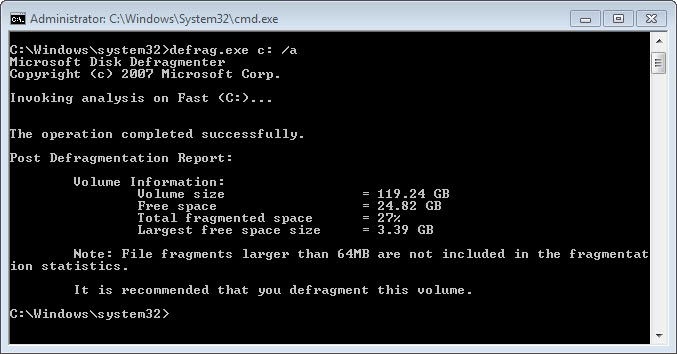

- Windows disk defragmenter vs defraggler windows 7#
- Windows disk defragmenter vs defraggler free#
- Windows disk defragmenter vs defraggler windows#

Solid State Drives (SSDs) should not be defragmented.In the past, the answer was a pretty clear “yes”, but things have changed. 2 Defragging would potentially move File 3 over two sectors, and move File 4’s (b) fragment to be adjacent to the (a) fragment, resulting in File 4 being contiguous. Making that happen is what defragging is all about. If File 4 were in one contiguous set of sectors, the process would be a tiny bit faster.

It’s just that in our silly little example above, if we want to read File 4 from end-to-end, we need to spend a little time “skipping over” File 3. The various fragments are all kept track of and located as needed. Fragmented files are handled transparently by the operating system and the file system. It’s important to note that this all works just fine. The only way to store File 4 is to split it into two fragments: two sectors in part (a) and two sectors in part (b). Now, we’ll create a new file, File 4, which is four sectors long.
Windows disk defragmenter vs defraggler free#
On this disk, we’ve created three files: File 1, File 2 and File 3.įile 1 takes up two sectors, File 2 takes two, and File 3 takes up five sectors on the disk, leaving three sectors free at the end.Īs you can see, that leaves a “hole” of two empty sectors between the remaining Files 1 and 3. And it all happens in a fairly random order.įor purposes of example, let’s say we have a very tiny disk that has exactly 12 sectors and no more. They are created or deleted they grow or shrink in size. Why fragmentation happensįragmentation happens because files on the disk are constantly changing. It’s also one of the things that differentiates one disk defragmenting tool from another: some are simply better or more efficient at moving things around as little as possible, so as to be done as quickly as possible with a result that’s as acceptable as possible. In fact, that’s what a defragmenting tool spends most of its time doing: moving files around on the disk to make room so other files can be laid out in order. In order for the sectors of one file to be arranged in order, other files or fragments of files may have to be moved out of the way to make room. Now, unlike the pages of a book strewn about your home, disk sectors are a little more limited in how they can be laid out. In a perfectly defragmented disk, the sectors of each file would be in an orderly sequence one right after the other, just like the pages in a book. Defragmentationĭefragmentation is nothing more than arranging all the pages/sectors together in order so they’re close to each other.
Windows disk defragmenter vs defraggler windows#
The result is that when you access the file, Windows has to race all over the disk to retrieve the whole thing. The sectors 1 that make up the file are scattered all over the disk. In order to read your book in order, you’re racing around the house because the pages are scattered all over. You have a list of where each page is, so when you want to read your book, you go find page 1, then consult the list for page 2’s location and go find it, look up page 3, go find it, and so on and so on. Imagine the pages of your book are randomly scattered throughout your house. To your computer, however, a file is a lot more like a bunch of pages in a book that it has to keep track of individually. You open it, you work on it, you save it. To you and me, a file on your disk is a single thing.
Windows disk defragmenter vs defraggler windows 7#


 0 kommentar(er)
0 kommentar(er)
